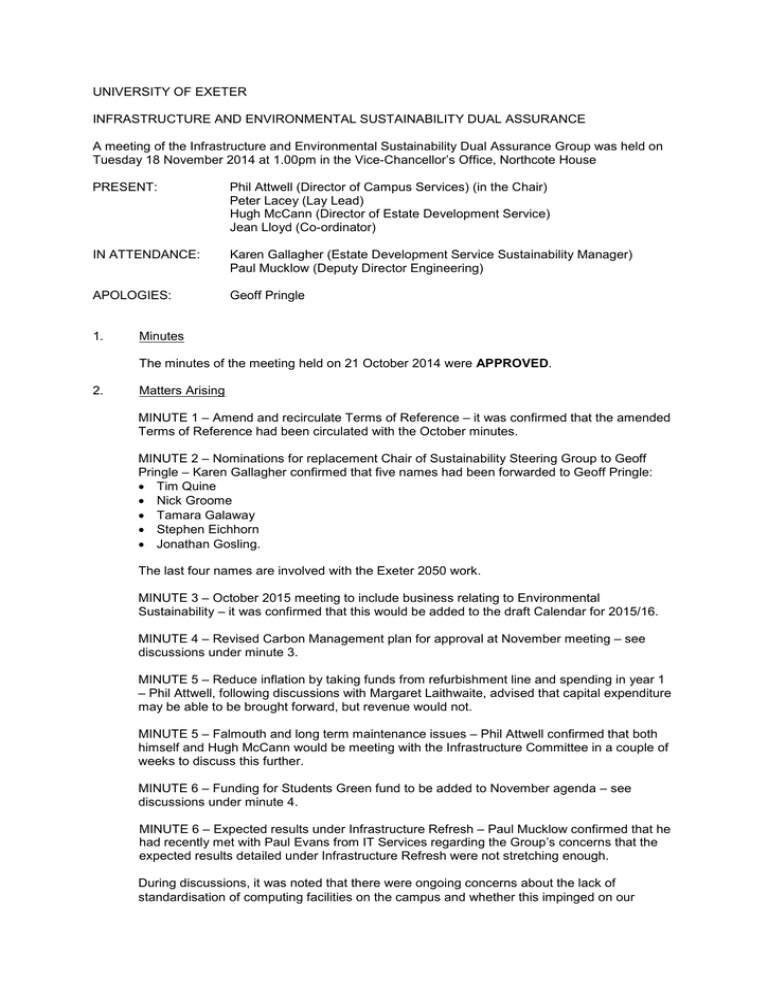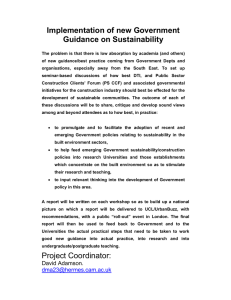Document 14939745
advertisement

UNIVERSITY OF EXETER INFRASTRUCTURE AND ENVIRONMENTAL SUSTAINABILITY DUAL ASSURANCE A meeting of the Infrastructure and Environmental Sustainability Dual Assurance Group was held on Tuesday 18 November 2014 at 1.00pm in the Vice-Chancellor’s Office, Northcote House PRESENT: Phil Attwell (Director of Campus Services) (in the Chair) Peter Lacey (Lay Lead) Hugh McCann (Director of Estate Development Service) Jean Lloyd (Co-ordinator) IN ATTENDANCE: Karen Gallagher (Estate Development Service Sustainability Manager) Paul Mucklow (Deputy Director Engineering) APOLOGIES: Geoff Pringle 1. Minutes The minutes of the meeting held on 21 October 2014 were APPROVED. 2. Matters Arising MINUTE 1 – Amend and recirculate Terms of Reference – it was confirmed that the amended Terms of Reference had been circulated with the October minutes. MINUTE 2 – Nominations for replacement Chair of Sustainability Steering Group to Geoff Pringle – Karen Gallagher confirmed that five names had been forwarded to Geoff Pringle: • Tim Quine • Nick Groome • Tamara Galaway • Stephen Eichhorn • Jonathan Gosling. The last four names are involved with the Exeter 2050 work. MINUTE 3 – October 2015 meeting to include business relating to Environmental Sustainability – it was confirmed that this would be added to the draft Calendar for 2015/16. MINUTE 4 – Revised Carbon Management plan for approval at November meeting – see discussions under minute 3. MINUTE 5 – Reduce inflation by taking funds from refurbishment line and spending in year 1 – Phil Attwell, following discussions with Margaret Laithwaite, advised that capital expenditure may be able to be brought forward, but revenue would not. MINUTE 5 – Falmouth and long term maintenance issues – Phil Attwell confirmed that both himself and Hugh McCann would be meeting with the Infrastructure Committee in a couple of weeks to discuss this further. MINUTE 6 – Funding for Students Green fund to be added to November agenda – see discussions under minute 4. MINUTE 6 – Expected results under Infrastructure Refresh – Paul Mucklow confirmed that he had recently met with Paul Evans from IT Services regarding the Group’s concerns that the expected results detailed under Infrastructure Refresh were not stretching enough. During discussions, it was noted that there were ongoing concerns about the lack of standardisation of computing facilities on the campus and whether this impinged on our carbon footprint. Data really needed to be located in one area. It was suggested that an audit was required to ascertain what other high performance computing was elsewhere on the campus. ACTION: Paul Mucklow to work with Paul Evans in drafting a more meaningful entry in the Sustainability Plan. 3. Carbon Management Plan Paul Mucklow in attendance The Group CONSIDERED a revised Carbon Management Plan. A version of the paper had been considered at the October meeting of the Infrastructure and Environmental Sustainability Dual Assurance (I&ES). The revised paper considered the setting for the University’s carbon reduction; the targets will be used as part of a University wide Low Carbon Commitment target campaign which will coincide with the launch of the fully revised suite of carbon management documentation. It was noted that with the current level of growth and available budget for energy projects it was unlikely that the University would reach the 2020 target of a reduction by 43%. However it was considered that the target should be both stretching and aspirational in order to support the University’s position as an internationally leading institution in climate change research. Therefore it was considered that the current target should stand. The Low Carbon Commitment Implementation plan needed to develop a funding strategy for approval by Council. The funding strategy would incorporate funding from Salix and HEFCE, long term maintenance, the Infrastructure Fund, energy performance contracting and the Green Investment Bank. Estate Development Services were now in a position to launch the University’s Low Carbon Commitment and were planning to roll this out early in the New Year to engage wider participation and awareness in carbon reduction. During discussions, the following comments were noted: • Part of the implementation plan was to look at the whole strategy and generation of energy across the campus. Providing our own generation instead of buying in could enable money from energy saving to be ploughed back into green services. • Security of supply could become an issue during the next 5-10 years and could possibly be another driver for looking at the generation of onsite combined heat and power (CHP). • Gas was more secure that relying on the grid. The University was in the process of upsizing the main incoming gas supply by 50%, which would enable the conversion of buildings which were currently oil fired. • The University was set up to use both medium and low pressure gas on campus, with the main supply being medium pressure. This enabled for more capacity across the campus, and during the mild winter last year enabled us to keep the prices down. • The Implementation Plan, still in draft form, set out the plan for reducing carbon across the University. Targets needed to be measurable and deliverable. Ownership would be through the current Campus Services Utilities Group. The Group’s Terms of Reference had changed over time, and it was agreed that the Group’s name should be reconsidered to reflect this. The Group would continue to report to the Sustainability Steering Group/I&ES Dual Assurance. • It was agreed that the University’s carbon setting be quoted against the HEFCE target. • We should have accountability transparency. If there was a risk of us not meeting our target by 2020, we needed a narrative as to why. • In achieving our targets, there had been a marked change in the University during the last 10 years. Appendix A of the paper detailed scenarios for carbon management saving. • It was clear that we would not be able to achieve the carbon target without capital investment at some stage of the journey. Tranche 4 had no investment line. We may need to consider looking at funding avenues/options outside the University and bringing in a third party. Turner & Townsend were using a framework for energy saving projects. It was possible that we could use the framework to prepare a tender document to investigate what the open market had to offer. In doing this, we would need to focus on the distinctiveness/broader ambitions of the University. ACTION: Paul Mucklow to investigate other funding models. Members of the I&ES Dual Assurance APPROVED the Carbon Management Plan which would be considered at the December meeting of Council under the Environmental Sustainability Report. The Group AGREED that the University’s Low Carbon Commitment Strategy be issued in the New Year. 4. Students Green Fund: Future Funding The Group RECEIVED a verbal update on the future funding of the Students Green Fund. It was noted that the Students’ Guild had been awarded £300k for a Green Fund and that this project would be coming to an end in July next year. The Guild was currently working on a plan for continued delivery, which would be circulated for feedback outside of the meeting. 5. Council Report for Environmental Sustainability The Group CONSIDERED the draft Council report for Environmental Sustainability. The report set out in summary the achievements for the academic year 2013/14 and the key priorities for environmental sustainability going forward. Areas highlighted in yellow in the report would change between now and submission to the December meeting of Council. During discussions, the following areas of the report were drawn to members’ attention: External Recognition: • Congratulations to Paul and the Cornwall House Team in receiving a 2014 Green Gown Award in the Construction and Refurbishment category. It was agreed that this would be highlighted in the report submitted to Council. • The University was also shortlisted for Sustainability Champion and the Students’ Guild in the Student Engagement category. • There were also accolades for awards in food and drink, all of which reflected a huge amount of work in the catering and retail outlets. • Green League Performance – results would be known on 2 December. Karen Gallagher advised that she had submitted five appeals this year. Assuming that the appeals did not go through, it was anticipated that we would drop to 50% in the Policy Section. Once results were known, a detailed analysis would be undertaken. Karen noted that we were not doing particularly well in food, which was down to the Green League mechanisms and the development of various metrics. Resources and Representation: • We were strengthening links with FXPlus and facilitating collaboration across campuses. • Once confirmed, the new Chair of the Sustainability Steering Group would be added to the report. Risk Management: • There were good stats for sustainable travel. Cycling had increased by 113%; car sharing had increased from 36 to 95; passengers for the D bus had increased with over 21,500 discounted tickets being sold to staff last year. Waste and Recycling: • This area continues to improve. In 2013/14, 1,032 tonnes of waste had been generated of which 43% had been recycled. This was set against a baseline of 1,284 tonnes waste arising and 26% recycling in 2010. Carbon and Energy Management: • There were clear quantitative investments and savings. Construction and Refurbishment: • There had been a wide range of refurbishment projects completed across the Estate during 2014, with the Knightley Building being a notable example. Curriculum, Research and Employability • Exeter’s first MOOC together with the Green Consultants had proved very successful. ACTION: • Karen Gallagher to include an additional paragraph under Construction and Refurbishment as per discussions in minute 3 above (Carbon Management), as well as including the carbon reduction graph. • Reference to the Bicycle Users Group to be included under Sustainable Travel. It was noted that future development would be considered at the March meeting of the Group. 6. Sustainable Travel Progress Update The Group NOTED the Sustainable Travel Progress Update. 7. Another Other Business Hugh McCann gave an update on the following areas: • Waites and Living Systems – a meeting was arranged for Thursday with the Waites Managing Director to discuss the claim further. It was noted that essentially we had not moved from our position. • Living Systems Building – the reinforced concrete frame was progressing. Early January was planned for the first fix. • South Cloisters – Midas has confirmed 27 February as the revised completion date. The lease on Veysey had been extended to 31 March. • Holman Test Mine – a offer of £30k had been submitted to the owners. The full evaluation for the site was £40k. The access road was unregistered land and there was an issue in respect of a sitting tenant. • Knightley Path leading from Streatham Drive to Streatham Rise – an application had been submitted to the local Planning Committee for the path alongside Knightley to be designated a public right of way. The decision had been upheld. It was now a question of whether the University appealed against the decision, and if so, which of the 3 options it chose to make the appeal under. 8. Date of Next Meeting Tuesday 16 December, 2.00pm 1 December 2014 M:\GENERAL ADMIN\4. COMMITTEE PAPERS\INFRASTRUCTURE AND ENVIRONMENTAL SUSTAINABILITY DA\18 NOVEMBER 2014\MINUTES IES 18 NOVEMBER 2014FINAL.DOCX ACTION TABLE Minute No. 2 3 5 5 Action Owner Work with Paul Evans in drafting a more meaningful entry in the Sustainability Plan Investigate other funding models. To include an additional paragraph under Construction and Refurbishment as per discussions in minute 3 (Carbon Management), as well as including the carbon reduction graph. Reference to the Bicycle Users Group to be included under Sustainable Travel. Paul Mucklow Paul Mucklow Karen Gallagher Karen Gallagher Status



